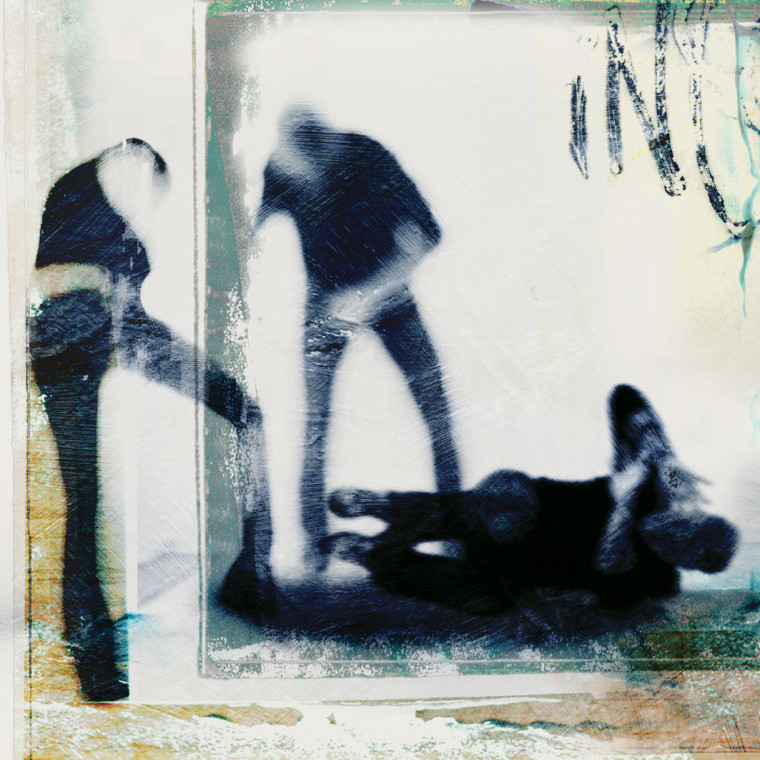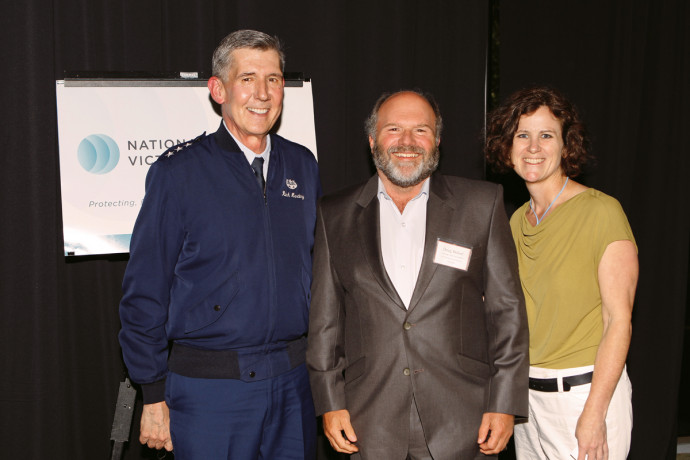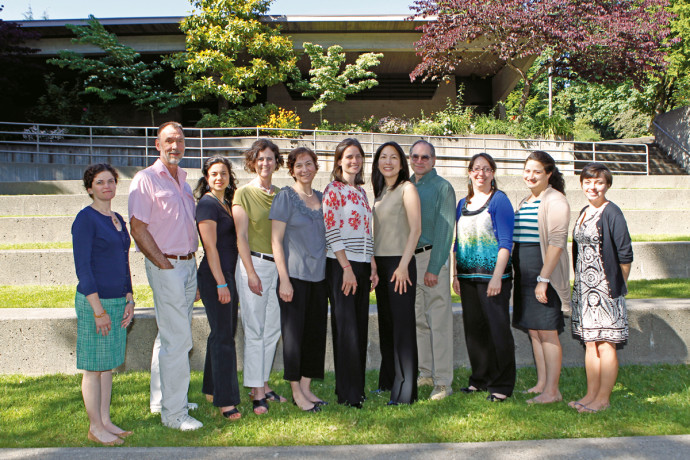A Voice for Victims
Open gallery

The National Crime Victim Law Institute at Lewis & Clark Law School promotes balance and fairness in a justice system that often neglects victims.
By Romel Hernandez
A woman with a restraining order against her ex-husband isn’t properly notified of the court date when he is to be sentenced on stalking charges. Only after the fact does she learn that her ex accepted a plea bargain and was sentenced—in her absence —to two years of probation and two months in jail. She misses the chance to speak her piece at the sentencing, to tell the judge her story about the terror she was living in as a result of his menacing phone calls.
She wants the judge to redo the sentencing, this time with her there. The judge says no. The defense argues that resentencing would amount to double jeopardy. The victim, Linda Barrett, takes her fight all the way to the Oregon Supreme Court, which rules in her favor in what turns out to be a landmark case. Six months later, the ex-husband is resentenced. This time the victim is heard. With the testimony provided by Barrett about his violent history and threats, the judge gets a clearer picture of the real situation and gives the defendant a tougher sentence of five years of probation as well as six months in jail for violating the terms of his original probation.
State of Oregon v. Barrett represented a major precedent-setting triumph for Lewis & Clark’s National Crime Victim Law Institute (NCVLI), which provided behind-the-scenes research and support in the case. “Barrett was a clear-cut victory—it represented the moment when victims were no longer treated as pieces of evidence in a case,” says Meg Garvin, executive director of NCVLI and a clinical professor at Lewis & Clark Law School.
This 2011 case “is the only victims’ rights issue that has been directly addressed by the Oregon Supreme Court,” says Rosemary Brewer, executive director of the Oregon Crime Victims Law Center, which represented Barrett and which was launched with funding and support from NCVLI.
Yet it took years of work by NCVLI and its allies to get there. “It took amending the Oregon Constitution, getting the state legislature to pass the statutes, and taking a case to the Oregon Supreme Court,” Garvin says. “Now we have a ruling to hold out as an example to the country.”

Since its founding in 2000 by Doug Beloof, professor of law at Lewis & Clark and one of the nation’s foremost experts in victims’ rights, NCVLI has been in the forefront of victim advocacy. The institute litigates both directly and through referral to lawyers whom it has trained and with whom it partners. The institute’s partners include 16 legal clinics around the country that represent victims directly and the National Alliance of Victims’ Rights Attorneys (NAVRA), which is also run through NCVLI and boasts more than 1,000 members nationwide. The institute serves these partners as a nationwide clearinghouse for research and strategic litigation support related to victims’ rights.
NCVLI was honored this year by the U.S. Department of Justice with its Crime Victims’ Rights Award. Ironically, the award comes as Congress has reduced funding for the institute, as well as the legal clinics that used to receive their federal dollars through NCVLI. “The award is in recognition for doing our cutting-edge work right when funding is tightest,” Garvin says.
Beloof was motivated to create NCVLI (and he still sits on its board) after his early career experiences as a county prosecutor, seeing what he calls the “barbaric” manner in which victims were treated. “I saw firsthand how dismissive the process was toward victims of crime,” he says. “There was just no place for them in the system—they were just witnesses who were sent subpoenas, sat outside the courtroom until they were called to testify, and were then sent away.”
Beloof was motivated to create NCVLI after his early career experiences as a county prosecutor, seeing what he calls the “barbaric” manner in which victims were treated.
A crime victim has the following rights:
- The right to be reasonably protected from the accused.
- The right to reasonable, accurate, and timely notice of any public court proceeding, or any parole proceeding, involving the crime or of any release or escape of the accused.
- The right not to be excluded from any such public court proceeding, unless the court, after receiving clear and convincing evidence, determines that testimony by the victim would be materially altered if the victim heard other testimony at that proceeding.
- The right to be reasonably heard at any public proceeding in the district court involving release, plea, sentencing, or any parole proceeding.
- The reasonable right to confer with the attorney for the government in the case.
- The right to full and timely restitution as provided in law.
- The right to proceedings free from unreasonable delay.
- The right to be treated with fairness and with respect for the victim’s dignity and privacy.
The victims’ rights movement aims to give victims a voice in the courtroom. It’s a controversial idea, given that the criminal justice system is organized around prosecution versus defense, usually leaving victims out of the equation.
In 2004, Congress passed the Crime Victims’ Rights Act, which NCVLI assisted in drafting. The act sets out eight distinct rights for victims in federal cases (see related article on page 31). Four years later, Oregon voters overwhelmingly passed an amendment to the Oregon Constitution setting forth similar legal rights for victims in state courts. Oregon is one of 33 states to have passed constitutional provisions related to establishing victims’ rights.
Steven Twist, an Arizona attorney who was one of the key architects of the federal law, says the legislation is just the starting point. “It’s not good enough to just have these rights on paper,” he says. “You have to go into court and litigate them with real people.”
One such person is Angie Ortega of Salinas, California. When her daughter’s killer was up for parole after 18 years in prison, she contacted NCVLI to protect her rights. “I was in a moment of despair,” she says. The institute connected with a NAVRA member specializing in victims’ rights, Amy Terrible, who agreed to take on the case pro bono. Terrible worked with the family on its presentation to the parole board last May. In the end, the convicted murderer was denied parole. Garvin notes that NCVLI would have helped on the case even if Ortega had wanted to speak in favor of parole. “Victims’ rights are civil rights,” she says. “Key among these rights is that victims have a voice in the system and a voice that is truly heard, regardless of what they want to say.”
“This was about justice for my daughter,” Ortega says. “Having an attorney made all the difference. She was able to give a voice to my daughter, Lorraine.”
NCVLI has been involved in cases that have set important precedents in victims’ rights. At the federal level, the institute provided litigation support and wrote an amicus brief in Kenna v. District Court, a 2006 case that upheld victims’ “indefeasible” right to speak at sentencing. More recently, NCVLI lawyers wrote an amicus brief in the high-profile sexual assault case against former Penn State football coach Jerry Sandusky. The brief supported the rights of the victims to proceed in the case using pseudonyms.
NCVLI aims not only to advance rights through cases but also to educate lawyers prepared to argue for these rights. The institute has helped put Lewis & Clark Law School in the vanguard of the victims’ rights movement.
Although it is an independent nonprofit run by its own board of directors, NCVLI has strong ties to the law school. Every semester, six law students participate in an intensive clinic with the institute, conducting research and writing briefs and memoranda in cases nationwide. Garvin also serves as the faculty advisor to the Crime Victims’ Rights Student Group, which has50 law student members and runs monthly roundtables on campus. The institute hosts interns and externs and also runs regular volunteer days that attract alumni.
Last spring, Lewis & Clark law students worked on litigation ranging from a Utah case seeking restitution for a mother and child who were victims of sexual assault, to a Florida case involving human trafficking. NCVLI assisted in more than 150 cases last year.

“Our law students are exposed to practical litigation skills and the inner workings of a nonprofit—they see the whole shebang,” Garvin says. “The goal is to give them an intensive, practical experience so that when they leave they know how to represent crime victims.”
In addition, Lewis & Clark law students garner important work experience with NCVLI. Pam Frazier, a 2013 law school graduate, was one such student. “I saw the experience as a way to get a third perspective into the criminal justice system, a viewpoint you wouldn’t get by working in a district attorney or a public defender’s office,” Frazier says.
Melanie Kebler JD ’08, who worked for several years as a county prosecutor, recently started volunteering for the institute. She has been interested in victims’ rights since her student days, when she took the clinic course through NCVLI. “I knew I wanted to help,” she says. “The issue of victims’ rights was something I believed in and wanted to support.”
Another key part of NCVLI’s work is raising awareness. Every spring, the institute hosts the national Crime Victim Law Conference. This year, more than 200 participants came to campus to attend presentations such as “The Frontier of Victim Restitution” and “Victims’ Rights Pre-Charging and During Plea: Do They Exist and How Do You Fight for Them?”
Garvin and her attorneys crisscross the country conducting training seminars for attorneys. “We do a ‘how-to’ for representing victims because no one learns about this in law school,” she says.
Earlier this year, the U.S. Air Force’s Judge Advocate General’s Corps signed up for intensive training specifically related to sexual assault. Rocked by numerous sex assaults and other crimes, the Air Force was looking to do more to help victims. “It’s no surprise—you can read any newspaper—that we have a challenge when it comes to sexual assault,” says Lt. Gen. Richard Harding, the Air Force’s judge advocate general. “We’ve been looking for game-changing ideas.”
The goal is to give students an intensive, practical experience so that when they leave they know how to represent crime victims. Meg GarvinExecutive Director of NCVLI
The Air Force turned to NCVLI for victims’ rights training. “We needed to reach out to folks outside the military, and Meg [Garvin] is right at the top when it comes to victims’ rights,” Harding says.
Over the course of just a few months, NCVLI has trained 60 Air Force attorneys as part of a victims’ rights pilot program that could soon spread to the other branches of the military. “Change is difficult,” Harding notes, and the progress the Air Force has made in such a short time wouldn’t have been possible without NCVLI. “Our partnership is going extremely well,” he says, “and we couldn’t be more appreciative.”
NCVLI is continuing to support creating or strengthening victims’ rights laws in all 50 states, as well as pursuing a potential amendment to the U.S. Constitution.
As NCVLI makes substantial progress in raising awareness about victims’ rights, it is striving to keep pace with the rising demand for legal services. The institute receives most of its funding from the federal government, but Congress capped spending that supports nonprofit centers around the country that represent crime victims. The regional centers have been struggling. “We are on a shoestring budget to do national work,” Garvin says.
“The next step is figuring out stable funding,” Beloof says. “Victims have all these rights now, but there aren’t enough people out there to enforce them and advocate for their rights. We’ve come a long way. But are we there yet? No.”
Romel Hernandez is a freelance writer in Portland.
More L&C Magazine Stories
Lewis & Clark Magazine is located in McAfee on the Undergraduate Campus.
MSC: 19
email magazine@lclark.edu
voice 503-768-7970
fax 503-768-7969
The L&C Magazine staff welcomes letters and emails from readers about topics covered in the magazine. Correspondence must include your name and location and may be edited.
Lewis & Clark Magazine
Lewis & Clark
615 S. Palatine Hill Road MSC 19
Portland OR 97219

